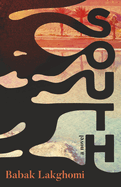
South, the first full-length novel from Iranian Canadian writer Babak Lakghomi (Floating Notes), is an unsettling surrealist portrait of surveillance and paranoia. B, a journalist, doesn't know what to expect when he is assigned to cover a series of labor strikes on an oil rig in the middle of the South, a mysterious desert country. With his marriage faltering at home and his book about his father still being altered by his editor into something unrecognizable, his life already feels like an unfamiliar place. But the isolation, corruption, and manipulation he finds in the South is beyond what he expected. Worse still is the unknowability of forces that seem to be bent on his destruction: evil spirits that travel on the wind and shadowy government forces alike.
Lakghomi's sparse, taut descriptions quickly conjure a world that exists uncannily alongside our own, one that reads like both a near-future dystopia and a recent-past industrial wasteland. The stories B hears from the haunted figures he encounters infuse this world with creeping superstitions and prophecies of doom that underline its precarious position, teetering on the brink of the past and the future. Together, these whispers and the phantom evidence of constant censorship and surveillance create an atmosphere of intangible but ever-present threat.
B's hallucinatory nightmare--part fever dream and part psychoanalytic quest--fits into the contours of a noir: the personally troubled detective, a system of corruption that eludes discovery, a femme fatale flickering on the periphery. Moreover, its puzzle box nature makes South feel like a Lynchian descent into the paranoia and alienation of totalitarianism. --Alice Martin, freelance writer and editor

